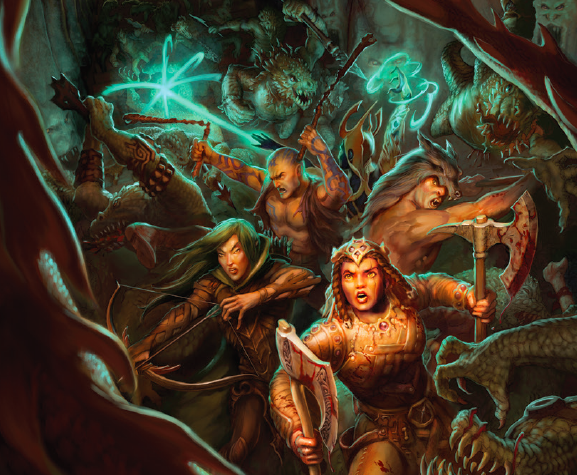 The section on damage resistance in the core book says, “If there’s an automatic damage effect that feels like it should have a chance of being reduced by resistance, go ahead and fake an attack roll to see if the effect penetrates resistance.” My question is, if the attacker has the shocked condition from the 13th Age Bestiary 2— which requires them to roll twice on all d20 rolls and take the lower—would it apply to that “fake” d20 roll?
The section on damage resistance in the core book says, “If there’s an automatic damage effect that feels like it should have a chance of being reduced by resistance, go ahead and fake an attack roll to see if the effect penetrates resistance.” My question is, if the attacker has the shocked condition from the 13th Age Bestiary 2— which requires them to roll twice on all d20 rolls and take the lower—would it apply to that “fake” d20 roll?
Yes: a d20 roll for this purpose is still a d20 roll. Having said that, the shocked condition is only used by one monster (the gibbering mouther) and in hindsight Rob and Jonathan really don’t like it. You’re welcome to forget that the shocked condition exists and use the weakened condition instead—you probably won’t be seeing shocked again in any future books.
Disengaging and popping free and movement, oh my! If you pop free from an enemy you’re engaged with, can you move? Can you move and engage someone else who is at near distance? The whole pool of these features is murky!
Yeah, it can be confusing! I’ll see if I can clear things up. The main thing to remember is that if a character starts their turn not engaged with an enemy, they can move freely.
If you’re engaged with one or more enemies at the start of your turn and you want to get away from them and go somewhere else, you have two options.
Move and take the hit
If you use your move action to break free of melee and go somewhere else, each enemy you’re engaged with gets to make an opportunity attack against you as a free action. After those attacks are resolved you can move normally, assuming you haven’t been hacked to bits. You’re free to move and engage another nearby enemy.
Try to disengage
Your other option if you’re engaged is to make a single disengage check (11+). Your roll takes a -1 penalty for each foe beyond the first that you’re disengaging from (so if you’re engaged with three gnolls, you’d take a -2 penalty to the roll.) If your disengage check succeeds you can move normally—including moving to engage another nearby enemy—without taking an opportunity attack. If the check fails, nothing happens except you’ve used up your move action for this turn and are still engaged. Because you’ve used your move action you can’t decide to move anyway and take the opportunity attack. That action isn’t available to you anymore on that turn. You gave that up when you chose to make a disengage check.
Popping free
Certain monsters have abilities that cause a target to pop free. Unlike disengaging, popping free isn’t an action: it’s a change in your situation. When you pop free from an enemy you’re engaged with, or if it pops free from you, you’re no longer engaged with them. If that happens at the start of your turn, you can move normally. If not, you can move normally at the start of your next turn, assuming you’re still not engaged at that point.
Teleporting
Teleporting is a “Get Out of Engagement Free” card. It doesn’t draw opportunity attacks, which makes playing a high elf a compelling option for high damage/low defense type characters. (Assuming the player remembers they have the ability.)
Got a question for 13th Sage that you can’t get an answer to elsewhere? Submit it here!
13th Age combines the best parts of traditional d20-rolling fantasy gaming with new story-focused rules, designed so you can run the kind of game you most want to play with your group. 13th Age gives you all the tools you need to make unique characters who are immediately embedded in the setting in important ways; quickly prepare adventures based on the PCs’ backgrounds and goals; create your own monsters; fight exciting battles; and focus on what’s always been cool and fun about fantasy adventure gaming. Purchase 13th Age in print and PDF at the Pelgrane Shop.




 The section on damage resistance in the core book says, “If there’s an automatic damage effect that feels like it should have a chance of being reduced by resistance, go ahead and fake an attack roll to see if the effect penetrates resistance.” My question is, if the attacker has the shocked condition from the
The section on damage resistance in the core book says, “If there’s an automatic damage effect that feels like it should have a chance of being reduced by resistance, go ahead and fake an attack roll to see if the effect penetrates resistance.” My question is, if the attacker has the shocked condition from the